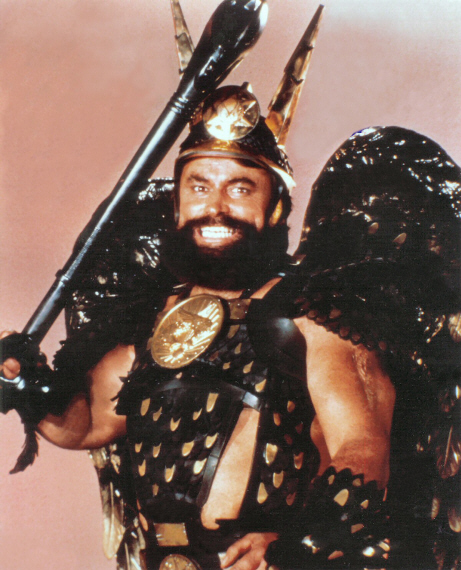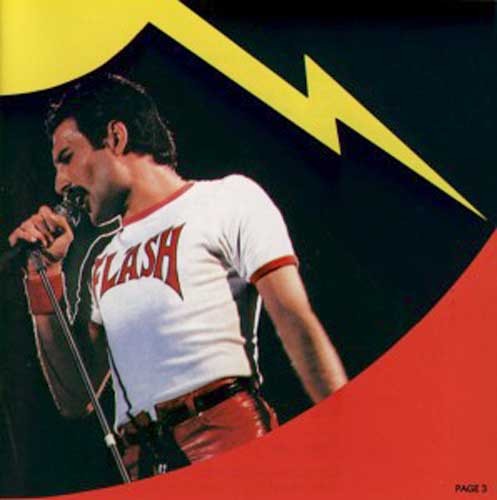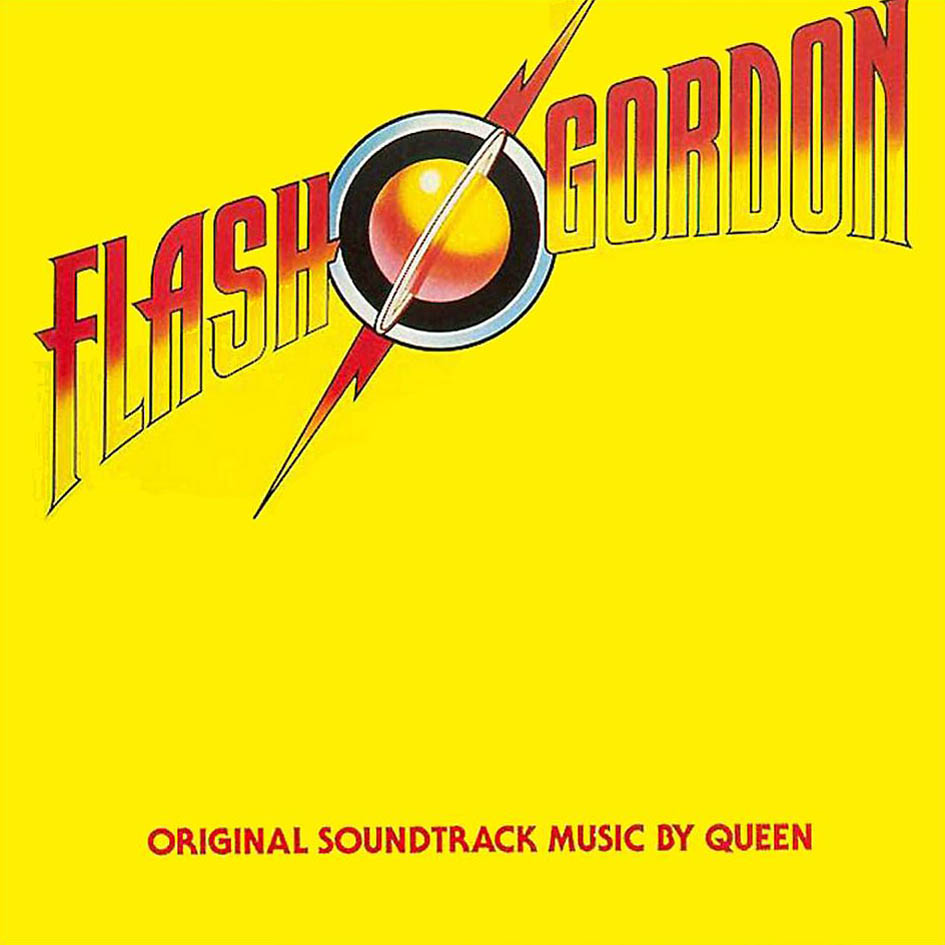Flash OST
When, in 1980, Queen were commissioned to soundtrack a high-camp movie adaptation of Alex Raymond’s comic strip Flash Gordon, few would have expected it to be quite such an accomplished work. Indeed, even fewer thought it was worth considering as a proper Queen album, with only two of its tracks featuring a Freddie Mercury vocal. What separates this work from other soundtrack recordings is its relative complexity compared with much popular music, and its relative simplicity and clarity of expression compared with most action film scores. The OST holds an interesting place in Queen’s back-catalogue as well; at times more bombastic, at times subtler than anything else they recorded. Leitmotifs are established for both character and emotional state (in a manner not too dissimilar to later Wagner works), subjected to tweaks to denote changes in mood. And, best of all, Queen remember that they’re a fucking rock band. And they fucking rock.
The Flash OST is a bizarre and hypnotic work when considered in isolation, well worthy of stoner devotion reserved for the likes of Piper At The Gates Of Dawn or the cool, modern appreciation of Morricone. It bleeds atmosphere and poise, but is not adverse to hilarity, even becoming hysterical at some points. A fine blend that is never too self-conscious or over-complicated. But married to the images that Mike Hodges provides, the work becomes an accomplished, slick and instinctive whole. Beginning with the main musical themes and continuing through similarities to operatic convention, it is a cohesive whole.
Thematic Developments
The film itself and its archetypes lend themselves totally to a soundtrack such as this. High-camp it may be (and intentionally so), but the only way to convince with the soundtrack is to play it totally straight, and Queen’s almost-prissy accompaniment to scenes of ridiculous spectacle and sci-fi gaudiness is supremely intuitive. Take the hero’s main theme for example; a pulsing and powerful exposition with effective and camp interjections of “Flash!”. Following that, Brian May’s signature sound and some homophonic rhythmic trickery complete the ‘song’, such as it is, but it’s the initial piano-bass-drums throb that makes the most thematic impact. Simple it may be, but it echoes the menace of Williams’ Jaws and a serves as a blank canvas with potential for infinite elaboration.
‘The Love Theme’ is possibly the most sophisticated example of the leitmotif throughout the OST. Quietus scribe, Jimmy Martin, from London experimental band Teeth Of The Sea, has more insight than most into the instrumental sections of Flash Gordon, having performed the soundtrack as a whole, and suggests ‘The Love Theme’ contains depths not usually present in Queen’s material. “The love theme is an example of a deftness of touch which people often forget about in the oeuvre of Queen” says Jimmy, and he’s totally right. On its first hearing in Dr. Zarkov’s space capsule (00:15:39), ‘The Love Theme’ is basically a psychedelic and melancholy series of synthesizer chords. As Flash and his love Dale Arden’s fingers intertwine, we see the earth rotating through the capsule window, in a perfect match of milieu and musical mood. It soon escalates into a light gallop as Roger Taylor’s drums signal the capsule’s approaching the planet Mongo, but the chords persist, reacting very little to the newly-imbued rhythmic direction.

A winged tit
When ‘The Love Theme’ returns later on (00:32:11), Flash is on the verge of being put to death and Timothy Dalton has hilariously just called his girlfriend a bitch. Again, the mood becomes almost hallucinogenic. Dale circles the strung-up, almost-naked Flash, and they talk about their whole predicament being nothing more than a dream. Again, rhythmic direction signifies impending development. In this case, the regular drum beats are diegetic only and come from Ming’s masked henchmen, signalling Flash’s imminent death. That the theme is constantly threatened by rhythm is indicative of the clever understatement Queen employ in their thematic developments.
The most sophisticated use of thematic gesture sees Queen combining two already-established themes. The ‘Battle Theme’ (01:28:23) is one of the defiantly rock moments on the OST, but slots in both the guitar motifs from the original Flash theme (to establish his presence and heroics) and the theme for Vultan (Brian Blessed as a constantly guffawing winged tit) and his flying soldiers. The rock tempo and aesthetic is established by Roger Taylor’s drum intro and Brian May takes care off the riffing, but atop it sits the synthesizers of Vultan’s army and neatly interjected segments of the ‘Flash Theme’. It is the film and the soundtrack’s most triumphant moment, both compositionally and for the way it evokes the recklessness of a load of semi-clad flying beardies attacking a spaceship.
Operatic Parallels
Of course, these thematic devices are, in their heritage, the preserve of Classical and Romantic-period opera. Though many OSTs borrow as liberally as Flash Gordon does, few can claim the narrative frameworks to justify it. Honest. Flash is a story ripe for an operatic interpretation. Mongo and its surrounding moons are presided over by one maniacal dictator, a staple character type, who has spent aeons playing those moons off against each other. So when Flash, Dale and Zarkov arrive in Ming’s court to find Brian Blessed and Timothy Dalton arguing over who has paid what tribute to their dictator, uneasily hailing him as their leader, an atmosphere of social antagonism is already enveloping. Ming’s merciless killing of the Prince of Ardentia is the moment at which the operatic conventions reach something of a zenith (00:24:02). His stabbing is heralded by a powerful, diminished chord in the brass, a startlingly simple illustration of the death of freedom, the absence of humanity. It’s a short moment, but one that is further emphasised by another brass chord (not dissimilar from Holst’s final chord of ‘Mars’ from The Planets Suite) as he is hoisted aloft by his subjects (00:24:13). Times, it seems, are terribly turbulent in this universe, and the world of operatic accompaniment lets the audience know just how.
Ming The Merciless has a seemingly unending string of concubines. They continually fawn over him and are apparently ready at any moment to gratify him sexually. This is not unlike the role of Pasha Selim in Mozart’s Die Entführung aus dem Serail, wherein this overseer of a particularly gaudy seraglio is surrounded by women and runs a somewhat tyrannical scenario (at least until the finale, when he shows uncharacteristic contrition by turning out to be a nice bloke). Furthermore, Ming’s magic ring itself finds many parallels in the operatic world. Apart from the obvious Wagner connection, there are all manner of entrancing implements in opera, from the flute in The Magic Flute to Carmen’s chromatic melodies designed to seduce her suitors in the eponymous Bizet work.

Ready Freddie
‘The Kiss’ theme (00:37:11), in which Ming’s daughter Aura apparently awakens Flash from the dead, is the most closely indebted to classical opera’s mistrust of the exotic. She is evil through and through, strumpetting around with other blokes while protesting fidelity to a knowing Timothy Dalton, she’s dangerous, violent and mental for sex. She loves it. Sitting astride Flash’s lap while he pilots a spaceship? Oh, do come on. But ‘The Kiss’ has the same serpentine quality and chromatic nature associated with early depictions of the Ottoman Empire in Mozart operas – their lack of strong, tonal melody made them something of an unknown, a sexy threat. Aura is certainly this, in Flash’s eyes at least she is some sort of goddess with a barbed tongue, and one that he is totally entranced by until he remembers that he’s already going out with a functional travel agent.
Rock Elements
Remember how Queen fucking rock? It seems they were incapable of maintaining that straight face for the whole of Flash Gordon, and had to let it all hang out for a few moments at least. In a totally plausible sequence in which our quarterback hero defeats some battle-hardened henchmen by throwing American football-sized green eggs at their heads, Queen polarise the restraint they’ve shown so far (00:27:59). The synth-led melody develops into a Brian May guitar explosion, with John Deacon’s bass providing a remarkably metallic chug.
The ultimate in high-camp for Flash Gordon comes in the arranged wedding scene between Ming and Dale. Of all the cultural hallmarks and incredible elements of Earthly influence in a far-off galaxy (presence of the English language, the race of lizard-‘men’, traditional monarchies), Brian May’s performance of ‘The Wedding Theme’ (01:33:47) as a multi-voiced guitar solo has to be the high watermark. Tasteless and shamelessly decadent, it captures the brazenness of Flash as a whole, but works along the same lines of May’s performance of the National Anthem on the roof of Buckingham Palace in 2002. It was utterly ridiculous, but enough people found it cool to make it an iconic moment.
Even better than that, the battle theme that heralds Vultan and his Wingmen’s arrival close to Ming’s downfall (01:28:23) sees the band cut loose almost entirely in a rock exposition that sounds like a close cousin of their ‘Ogre Battle’ from 6 years previous. It is, as previously mentioned, something of a conglomeration of previous themes, but still has enough power chord ferocity and abandon to make it as triumphant as any of Queen’s most bombastic classics. Says Jimmy Martin: “Rock forms a perfect companion piece to the battle scene: Brian May’s unquenchable love of a good riff coupled with a gloriously ‘Boys-Own’ spectacle of cartoon violence.” This factor and elements of traditional rock are what simultaneously makes Flash traceable to a time and genre of light parody, but it is the conviction with which it is delivered that makes it a true lightning bolt of film music.
Queen, by virtue of their sensitivity, re-contextualise the soundtrack as a legitimate area for pop musicians to work in. Jimmy Martin concurs: “Although part of the glory of Queen was they were never overly concerned with looking cool or worried about acting ridiculous, this also didn’t mean that they weren’t erudite aesthetes when the time was right”. Indeed, they never much cared for being cool, but they were still pop musicians, and therefore not the logical choice for a fantasy film. Why not John Williams or, for those on a budget, James Horner? Queen were by no means a sensible selection, but their collective compositional chops meant that they brought pop energy to frameworks established by stiffer predecessors in the genre. The result was a multi-layered experience, enjoyable as a stand-alone, but enhanced immeasurably by its union with cinema.
For more news and views from Brian May, visit his website.
And for an exclusive Danny Miranda podcast interview click on this link for the Aussie Queens!


